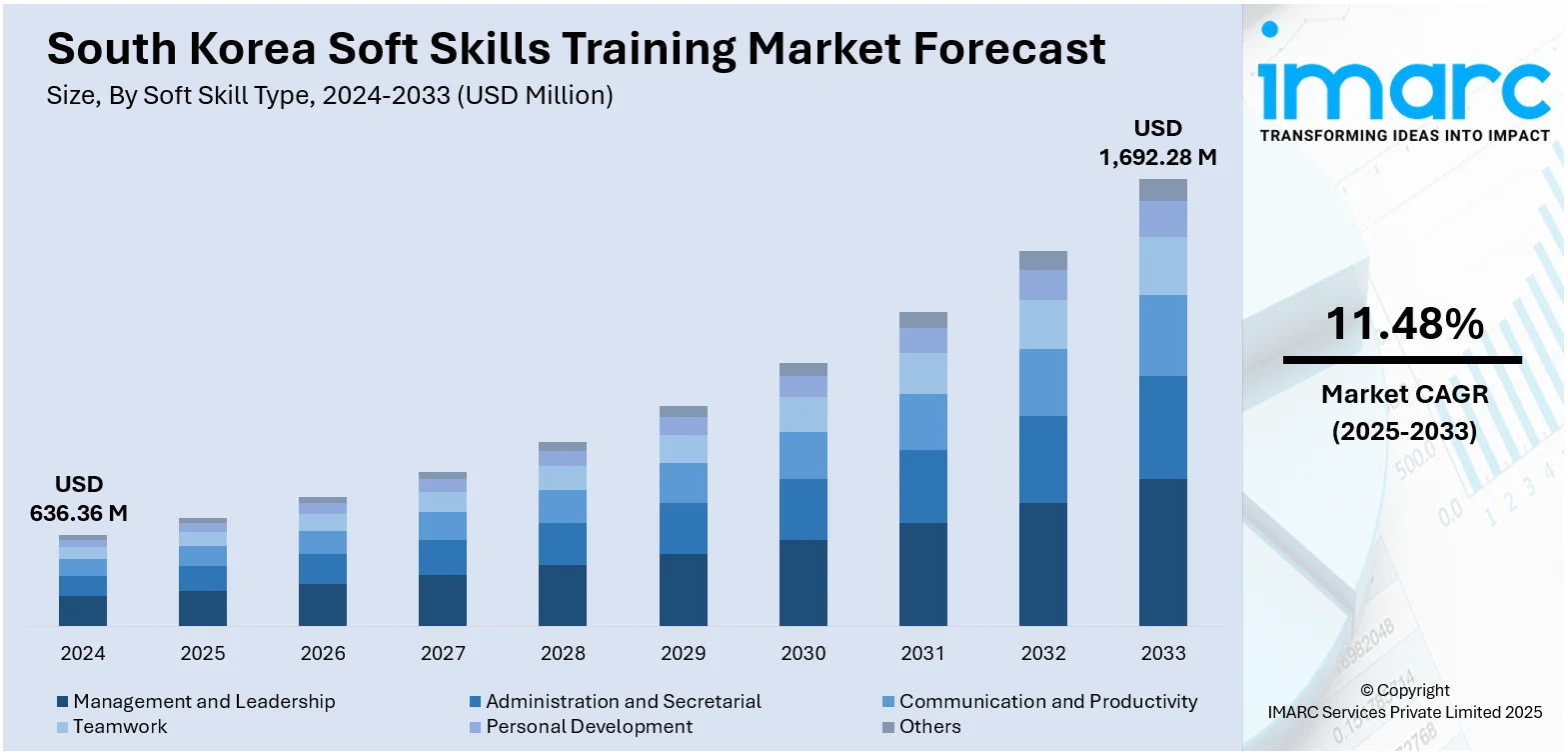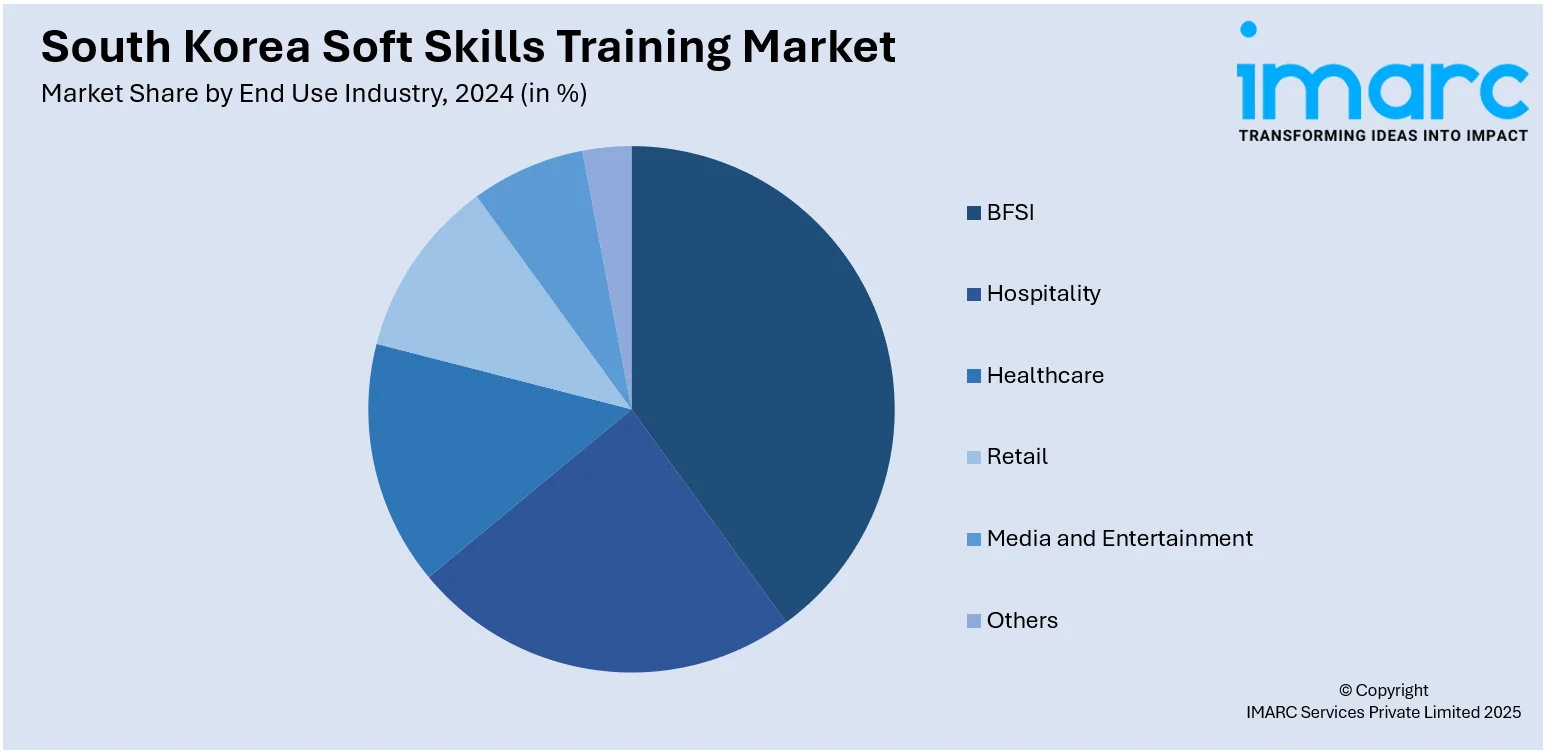
South Korea Soft Skills Training Market Size, Share, Trends and Forecast by Soft Skill Type, Channel Provider, Sourcing, Delivery Mode, End Use Industry, and Region, 2025-2033
South Korea Soft Skills Training Market Overview:
The South Korea soft skills training market size reached USD 636.36 Million in 2024. Looking forward, the market is expected to reach USD 1,692.28 Million by 2033, exhibiting a growth rate (CAGR) of 11.48% during 2025-2033. The industry is being driven by the growing demand for leadership and workforce flexibility. Organizations strive to enhance workers' communication, emotional intelligence, and problem-solving abilities as firms evolve. The South Korea soft skills training market share is increasing, indicating continued expansion.
|
Report Attribute
|
Key Statistics
|
|---|---|
|
Base Year
|
2024 |
|
Forecast Years
|
2025-2033
|
|
Historical Years
|
2019-2024
|
| Market Size in 2024 | USD 636.36 Million |
| Market Forecast in 2033 | USD 1,692.28 Million |
| Market Growth Rate 2025-2033 | 11.48% |
South Korea Soft Skills Training Market Trends:
Rising Demand for Communication and Collaboration Skills
The need for better communication and teamwork skills has grown as South Korea's workforce becomes more connected and varied. Businesses are investing in training programs that emphasize conflict resolution, cooperative teamwork, and effective interpersonal communication. Organizations are concentrating on developing workers who can collaborate across departments and with clients around the world in light of the rapidly evolving global marketplace. Employees must adapt to different communication styles and cultural variations because cross-functional teams are regularly requested to collaborate on complicated projects. The ongoing expansion of the soft skills training market in South Korea is mostly due to the growing need for training in teamwork and communication. For example, the Busan Youth Global JOB Challenge Project, introduced in June 2025, links local businesses with young professionals who have worked abroad. It offers internships, matching services, and post-hire assistance, including business financial help. The project, which targets 50 businesses and 50 young participants, intends to improve employment prospects and regional growth.

To get more information on this market, Request Sample
Integration of Technology in Soft Skills Training
The South Korea soft skills training market growth is being driven by the incorporation of technology into learning processes. The growth of online and e-learning resources has changed the way soft skills are developed because it has made training more accessible, scalable, and flexible. These days, gamification, virtual classrooms, and interactive modules are common features of online learning programs that enable employees to develop their leadership, communication, and problem-solving skills whenever it is most convenient for them. Businesses are using these online learning systems to give staff members ongoing learning opportunities without interfering with their work schedules. The increasing demand for technology-oriented training as the workplace's digital revolution picks up speed will complement South Korea's market position in soft skills training. For instance, in December 2024, South Korea and Indonesia inaugurated the Smart Factory Training Center at Binus University in Bekasi. This center, part of a South Korea-Indonesia cooperation project, aims to enhance digital transformation in Indonesian SMEs by offering training on smart factory solutions and showcasing South Korean technologies.
South Korea Soft Skills Training Market Segmentation:
IMARC Group provides an analysis of the key trends in each segment of the market, along with forecasts at the country and regional levels for 2025-2033. Our report has categorized the market based on soft skill type, channel provider, sourcing, delivery mode, and end use industry.
Soft Skill Type Insights:
- Management and Leadership
- Administration and Secretarial
- Communication and Productivity
- Teamwork
- Personal Development
- Others
The report has provided a detailed breakup and analysis of the market based on the soft skill type. This includes management and leadership, administration and secretarial, communication and productivity, teamwork, personal development, and others.
Channel Provider Insights:
- Corporate/Enterprise
- Academic/Education
- Government
A detailed breakup and analysis of the market based on the channel provider have also been provided in the report. This includes corporate/enterprise, academic/education, and government.
Sourcing Insights:
- In-House
- Outsourced
A detailed breakup and analysis of the market based on the sourcing have also been provided in the report. This includes in-house and outsourced.
Delivery Mode Insights:
- Online
- Offline
A detailed breakup and analysis of the market based on the delivery mode have also been provided in the report. This includes online and offline.
End Use Industry Insights:

- BFSI
- Hospitality
- Healthcare
- Retail
- Media and Entertainment
- Others
A detailed breakup and analysis of the market based on the end use industry have also been provided in the report. This includes BFSI, hospitality, healthcare, retail, media and entertainment, and others.
Regional Insights:
- Seoul Capital Area
- Yeongnam (Southeastern Region)
- Honam (Southwestern Region)
- Hoseo (Central Region)
- Others
The report has also provided a comprehensive analysis of all the major regional markets, which include Seoul Capital Area, Yeongnam (Southeastern Region), Honam (Southwestern Region), Hoseo (Central Region), and others.
Competitive Landscape:
The market research report has also provided a comprehensive analysis of the competitive landscape. Competitive analysis such as market structure, key player positioning, top winning strategies, competitive dashboard, and company evaluation quadrant has been covered in the report. Also, detailed profiles of all major companies have been provided.
South Korea Soft Skills Training Market News:
- In September 2024, EON Reality introduced the EON SoftSkills Train AI platform, which uses AI-powered role-play scenarios and performance evaluations to enhance professional development. This innovative tool focuses on training employees in essential soft skills like communication, empathy, and conflict resolution, offering tailored lessons and insightful feedback for continuous improvement.
South Korea Soft Skills Training Market Report Coverage:
| Report Features | Details |
|---|---|
| Base Year of the Analysis | 2024 |
| Historical Period | 2019-2024 |
| Forecast Period | 2025-2033 |
| Units | Million USD |
| Scope of the Report |
Exploration of Historical Trends and Market Outlook, Industry Catalysts and Challenges, Segment-Wise Historical and Future Market Assessment:
|
| Soft Skill Types Covered | Management and Leadership, Administration and Secretarial, Communication and Productivity, Teamwork, Personal Development, Others |
| Channel Providers Covered | Corporate/Enterprise, Academic/Education, Government |
| Sourcings Covered | In-House, Outsourced |
| Delivery Modes Covered | Online, Offline |
| End Use Industries Covered | BFSI, Hospitality, Healthcare, Retail, Media and Entertainment, Others |
| Regions Covered | Seoul Capital Area, Yeongnam (Southeastern Region), Honam (Southwestern Region), Hoseo (Central Region), Others |
| Customization Scope | 10% Free Customization |
| Post-Sale Analyst Support | 10-12 Weeks |
| Delivery Format | PDF and Excel through Email (We can also provide the editable version of the report in PPT/Word format on special request) |
Key Questions Answered in This Report:
- How has the South Korea soft skills training market performed so far and how will it perform in the coming years?
- What is the breakup of the South Korea soft skills training market on the basis of soft skill type?
- What is the breakup of the South Korea soft skills training market on the basis of channel provider?
- What is the breakup of the South Korea soft skills training market on the basis of sourcing?
- What is the breakup of the South Korea soft skills training market on the basis of delivery mode?
- What is the breakup of the South Korea soft skills training market on the basis of end use industry?
- What is the breakup of the South Korea soft skills training market on the basis of region?
- What are the various stages in the value chain of the South Korea soft skills training market?
- What are the key driving factors and challenges in the South Korea soft skills training market?
- What is the structure of the South Korea soft skills training market and who are the key players?
- What is the degree of competition in the South Korea soft skills training market?
Key Benefits for Stakeholders:
- IMARC’s industry report offers a comprehensive quantitative analysis of various market segments, historical and current market trends, market forecasts, and dynamics of the South Korea soft skills training market from 2019-2033.
- The research report provides the latest information on the market drivers, challenges, and opportunities in the South Korea soft skills training market.
- Porter's five forces analysis assist stakeholders in assessing the impact of new entrants, competitive rivalry, supplier power, buyer power, and the threat of substitution. It helps stakeholders to analyze the level of competition within the South Korea soft skills training industry and its attractiveness.
- Competitive landscape allows stakeholders to understand their competitive environment and provides an insight into the current positions of key players in the market.
Need more help?
- Speak to our experienced analysts for insights on the current market scenarios.
- Include additional segments and countries to customize the report as per your requirement.
- Gain an unparalleled competitive advantage in your domain by understanding how to utilize the report and positively impacting your operations and revenue.
- For further assistance, please connect with our analysts.
 Request Customization
Request Customization
 Speak to an Analyst
Speak to an Analyst
 Request Brochure
Request Brochure
 Inquire Before Buying
Inquire Before Buying




.webp)




.webp)












